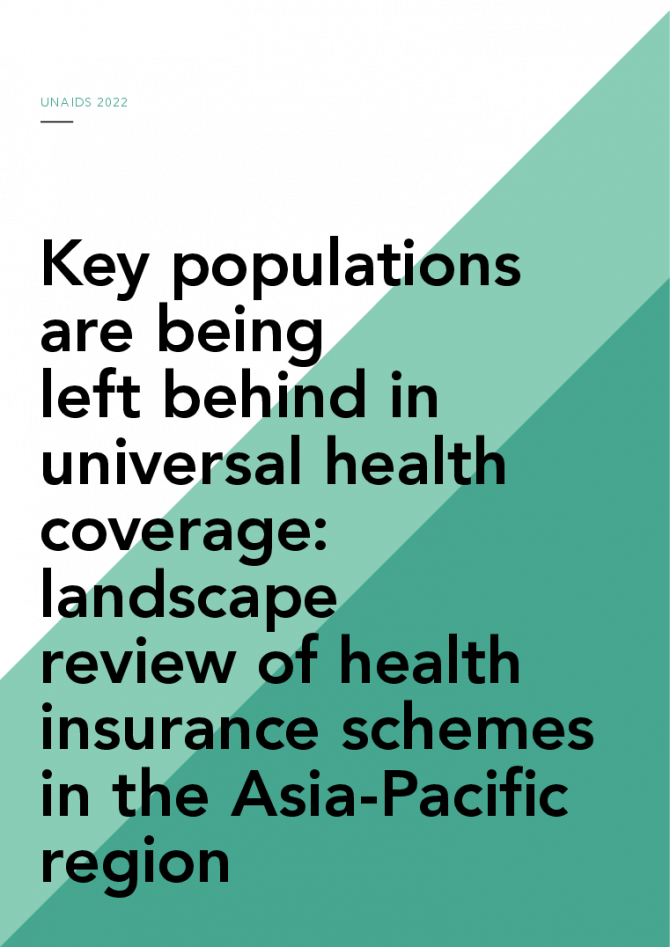
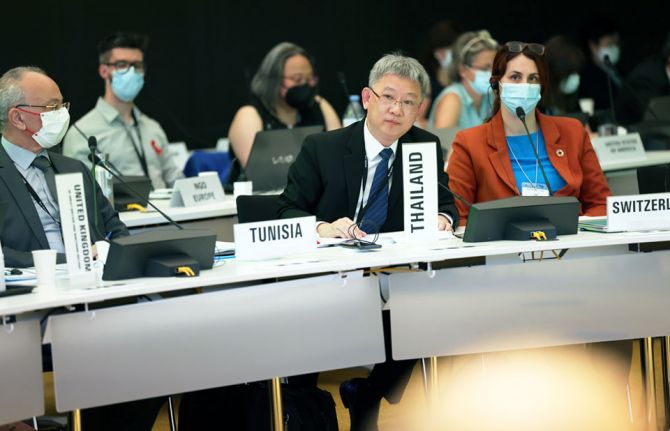
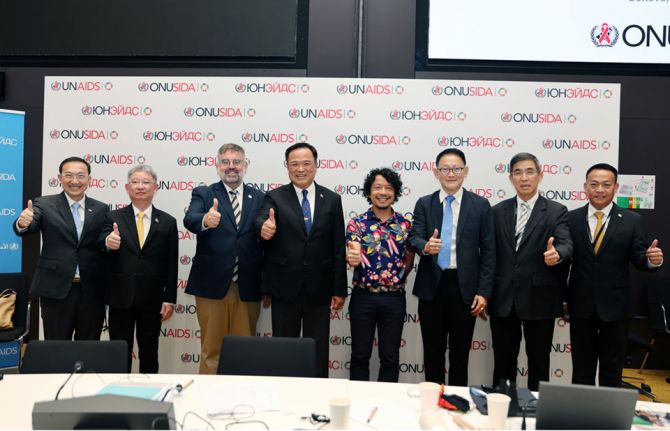
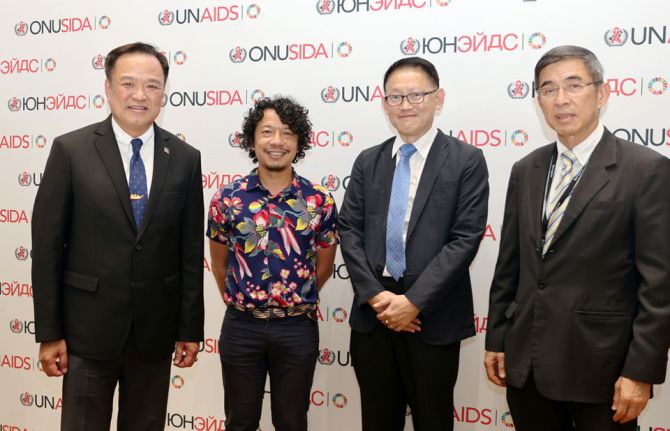
Feature Story
Ensuring sustainability of community-led HIV service delivery in Thailand
24 June 2022
24 June 2022 24 June 2022During the 50th Programme Coordinating Board meeting held in Geneva, Thailand announced formally funding community-led health services (CLHS) as public health services. The National Health Security Board of Thailand has approved HIV prevention, treatment, and care to be directly reimbursed by the Universal Health Coverage scheme.
“This is a key milestone for Thailand regarding sustainable community-led service delivery and sustainable financing for community-based organizations. It is a model for the region and countries globally,” said Winnie Byanyima, Executive Director of UNAIDS.
The role of community-led organizations in providing HIV services is well recognized as an essential component leading to ending AIDS by 2030. Using people-centered, rights-based and stigma-free approaches by and for key population community and people living with HIV has shown to lead to an increased uptake of essential HIV services.
Since 2016, Thailand has started to fund project-based community-led HIV services through the Universal Health Coverage scheme. The allocation of the national budget has increased over time to support community-led organizations (CLO) working with people living with HIV and key populations.
However, until now, year-to-year contracting mechanisms led to operational gaps affecting the provision of HIV services. The formal recognition of community-led health services under the UHC scheme will allow for faster access to funding, continuity of service delivery, and increase CLOs capacity for greater coverage of HIV services.
“To reach the ambitious goal of ending AIDS, we have partnered with community-based organizations who play a vital role in HIV service provision to hard-to-reach populations and marginalized communities,” said Anutin Charnvirakul, Deputy Prime Minister and Minister of Public Health of Thailand.
Organizations led by communities who are eligible to provide HIV and STI services in their communities can register as service providers under the National Health Security System. To get this recognition, they need at least one year of service experience and require an accreditation by the Ministry of Public Health or other certified bodies. Community health workers with relevant experience also have to be certified by a government agency or accredited organization.
The UNAIDS Thailand office has been working with different partners to support the scale-up of community health workers' certification and other accreditations as well as strengthening the sustainability of the community response.
In attendance at the 50th PCB were Dr Jadej Thammatacharee, Secretary General, National Health Security Office, Dr Opart Karnkawinpong, Director General, Department of Disease Control, Ministry of Public Health, Dr Suwit Wibulpolprasert, Advisor to the Office of the Permanent Secretary, Ministry of Public Health and the entire three day meeting was chaired by H.E. Mr Anutin Charnvirakul, Deputy Prime Minister and Minister of Public Health.
Region/country
Related
Documents
Key populations are being left behind in universal health coverage: landscape review of health insurance schemes in the Asia-Pacific region
28 March 2022
Universal health coverage is guided by the principle that individuals and communities receive the services they need, including essential good-quality health services, without suffering financing hardship. The establishment or expansion of government-sponsored health insurance is often promoted as the main vehicle to finance universal health coverage. For people living with HIV and people from key populations (sex workers, gay men and other men who have sex with men, transgender people, people who inject drugs, people in prison) living with or at risk of HIV, universal health coverage is considered a health-for-all solution for countries to integrate all HIV services, including prevention.
Related
What the data tell us: Projections for the HIV epidemic in western and central Europe and North America in 2030
28 March 2025
What the data tell us: Projections for the HIV epidemic in the Middle East and North Africa in 2030
28 March 2025
What the data tell us: Projections for the HIV epidemic in eastern Europe and central Asia in 2030
28 March 2025
What the data tell us: Projections for the HIV epidemic in Asia and the Pacific in 2030
28 March 2025
What the data tell us: Projections for the HIV epidemic in western and central Africa in 2030
28 March 2025
What the data tell us: Projections for the HIV epidemic in eastern and southern Africa in 2030
28 March 2025

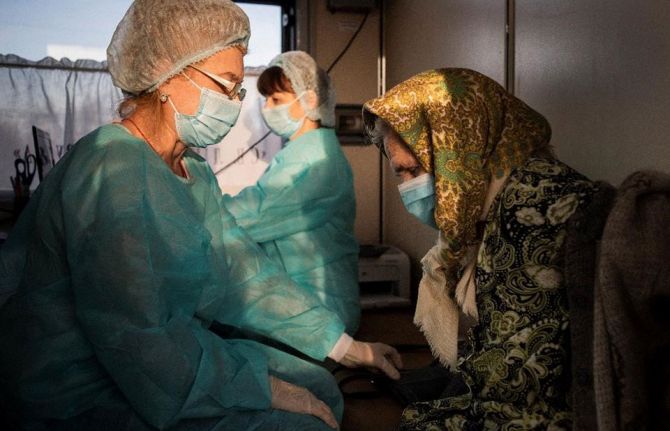
Press Statement
Addressing inequalities to ensure health and rights for all
12 December 2021 12 December 2021Statement by Winnie Byanyima, Executive Director of UNAIDS, on the occasion of Universal Health Coverage Day
12 December 2021
Winnie Byanyima
Executive Director of UNAIDS
Under-Secretary-General of the United Nations
As we commemorate Universal Health Coverage Day 2021, the world is entering year three of the COVID-19 pandemic. The pandemic has reminded us that no one is safe until everyone is safe. It shows how pandemics expose intersecting inequalities among people, countries and communities.
Universal health coverage means that all individuals and communities can access the health services they need without suffering financial hardship. But with at least half the world’s population lacking access to essential health services even before the COVID-19 pandemic, there is much work to do.
We must urgently focus on three things:
- First, addressing the inequalities that prevent us from achieving universal health coverage and from ending AIDS.
- We need people-centred data systems that highlight inequalities and prioritize work to address them.
- We must put human rights at the centre. The Political Declaration of the United Nations High-Level Meeting on Universal Health Coverage in 2019 called on countries to “reach the furthest behind first”.
- Second, strengthening support to community-based and community-led responses.
- Four decades of the AIDS response have demonstrated that such support is a crucial pillar for effective pandemic responses.
- Community engagement should be an integral part of health systems.
- Third, bolstering investment in health, sustainable and innovative financing, and ambitious thresholds for financial commitments.
- The Abuja Declaration, signed by African governments, to spend 15% of revenues on health is such an example.
- To achieve universal health coverage and pandemic control, we need a paradigm shift in global health financing and investments in community-led, human rights-based, people-centred and gender transformative responses.
On this Universal Health Coverage Day, I call for support and urgent action to ensure health and rights for all.
UNAIDS
The Joint United Nations Programme on HIV/AIDS (UNAIDS) leads and inspires the world to achieve its shared vision of zero new HIV infections, zero discrimination and zero AIDS-related deaths. UNAIDS unites the efforts of 11 UN organizations—UNHCR, UNICEF, WFP, UNDP, UNFPA, UNODC, UN Women, ILO, UNESCO, WHO and the World Bank—and works closely with global and national partners towards ending the AIDS epidemic by 2030 as part of the Sustainable Development Goals. Learn more at unaids.org and connect with us on Facebook, Twitter, Instagram and YouTube.
Our work

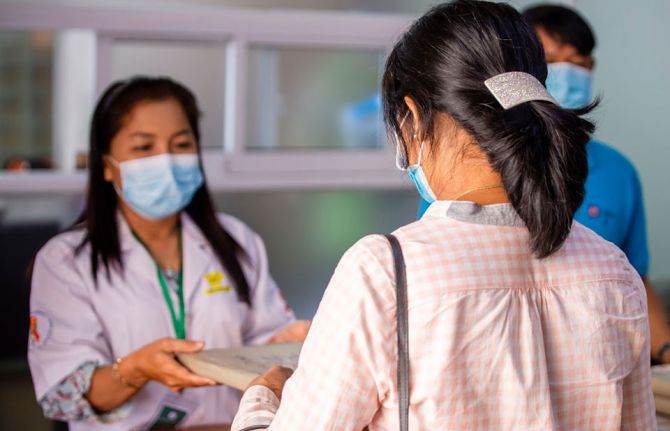
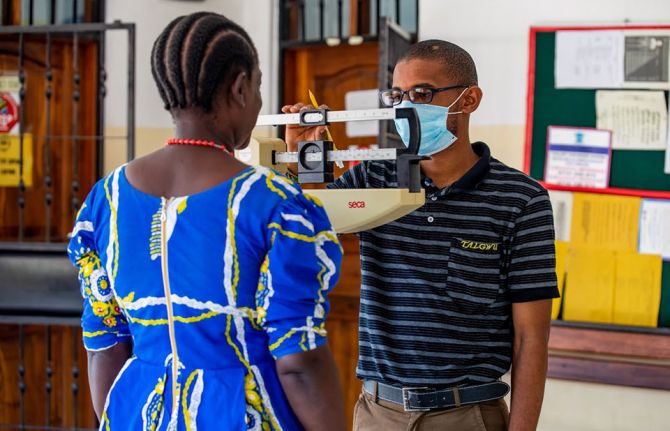
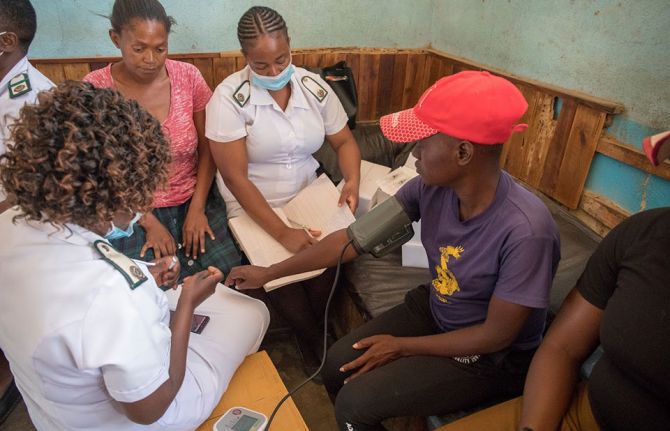
Press Statement
UNAIDS calls for rights-based and people-centred universal health coverage
12 December 2020 12 December 2020GENEVA, 12 December 2020—The world is only 10 years away from the deadline for the universal health coverage target of the Sustainable Development Goals. Only 10 years away from when everyone should have access to quality essential health services and access to safe, effective, quality and affordable essential medicines and vaccines. But that target seems as far away as ever. In 2017, less than half of the world’s people were covered by essential health services, and if current trends continue it is estimated that only 60% of the global population will enjoy universal health coverage by 2030.
On Universal Health Coverage Day, UNAIDS is calling for the world to meet its obligation— universal health coverage, based on human rights and with people at the centre.
“Health for all: protect everyone” is the theme for this year’s Universal Health Coverage Day, making it clear that health is a fundamental human right.
“It’s a disgrace that inequalities are still impacting the ability of people to access health care,” said Winnie Byanyima, UNAIDS Executive Director. “Health is a human right, but it is so often denied, especially to the most vulnerable, the marginalized and the criminalized.”
Someone’s socioeconomic status, gender, age, sexual orientation, citizenship or race can affect their ability to access health services. Like the HIV response, equality lies at the heart of universal health coverage and progressing towards universal health coverage means progressing towards equity, social inclusion and cohesion. A rights-based and people-centred approach to universal health coverage can help to ensure equitable health for all.
COVID-19 has shown that public health systems have been neglected in many countries around the world. In order to promote health and well-being, countries need to invest in the core functions of health systems, including public health, as common goods for health.
“Money should never determine someone’s access to health,” added Ms Byanyima. “No one should be pushed into poverty by paying for health services. User fees must be abolished and health for all paid for from public funds.”
Even before the COVID-19 pandemic hit, the global AIDS response was off track, in part because of a long-term underinvestment in health systems. Universal health coverage and the end of AIDS cannot be achieved and sustained without resilient and functioning health systems that can respond to the needs of everyone, without stigma and discrimination.
The HIV response has shown that communities make the difference. During the COVID-19 pandemic, community-led organizations, including communities of people living with HIV, around the world have mobilized to protect the vulnerable, working with governments to keep essential services going.
Communities have campaigned for multimonth dispensing of HIV treatment, organized home deliveries of medicines and provided financial assistance, food and shelter to at-risk groups. Communities are part of systems for health and are fundamental to attaining universal health coverage. They must be better recognized and supported for their leadership, their innovation and their immense contribution towards health for all.
UNAIDS
The Joint United Nations Programme on HIV/AIDS (UNAIDS) leads and inspires the world to achieve its shared vision of zero new HIV infections, zero discrimination and zero AIDS-related deaths. UNAIDS unites the efforts of 11 UN organizations—UNHCR, UNICEF, WFP, UNDP, UNFPA, UNODC, UN Women, ILO, UNESCO, WHO and the World Bank—and works closely with global and national partners towards ending the AIDS epidemic by 2030 as part of the Sustainable Development Goals. Learn more at unaids.org and connect with us on Facebook, Twitter, Instagram and YouTube.
Contact
UNAIDS GenevaSophie Barton-Knott
tel. +41 79 514 68 96
bartonknotts@unaids.org
UNAIDS Media
tel. +41 22 791 4237
communications@unaids.org
Our work
Press centre
Download the printable version (PDF)

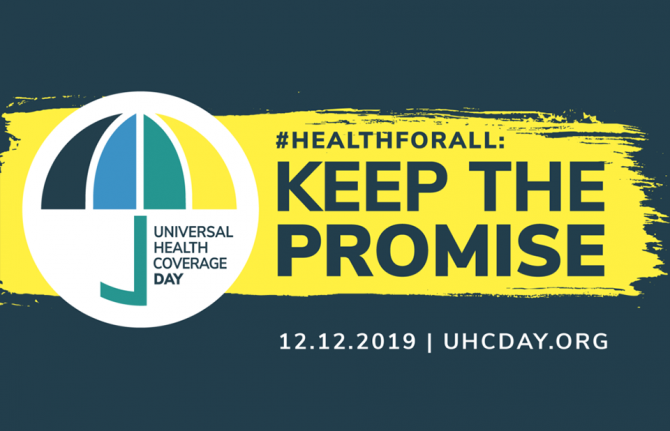
Press Statement
UNAIDS Executive Director's message on Universal Health Coverage Day
12 December 2019 12 December 201912 December 2019
On Universal Health Coverage Day, I stand in solidarity with all people who lack access to the health services that they need. Today, 10 000 of those people will die. Every two minutes, a woman will die giving birth. And every second, three people will be pushed into extreme poverty paying for health care. Today, those with the greatest need for health care are the least likely to get it. This must change, and it must change fast.
Universal health coverage is a human right that belongs to everyone on this planet. No matter who they are or where they live, everyone has the right to access quality health services without facing financial hardship. This was the historic commitment made by United Nations Member States in the political declaration made at the first-ever high-level meeting on universal health coverage last September.
Universal health coverage is central to our time and to the AIDS response, because better health outcomes are, first and foremost, about addressing inequities. Evidence that health coverage has truly become universal will be in improved health and in the elimination of the unacceptable inequality in health outcomes for the most marginalized populations. It will be the day when no parent has to make a choice between which child they will save because the cost of treatment is too high.
Each year, 100 million people are pushed into extreme poverty and 900 million face severe financial hardship paying for their health care. Despite commitments to bring these figures down, alarmingly they are on the rise. The fastest increase is in Africa, where two thirds of countries still charge user fees for all levels of care. This must change. User fees trap people, especially women and children, in cycles of poverty, illness and powerlessness. It is an injustice to force people to choose between paying for food, education or the health services they need. It is a human rights violation to detain patients in hospitals when they can’t afford their bill. Universal health coverage must lift the financial barriers to accessing health care. To ensure that rights are upheld and lives are saved, quality health care should be made available at the point of use for all people.
But universal health coverage needs also to go beyond the health sector, to address the social, economic and structural determinants of health, such as poverty, lack of formal education, gender inequality and gender-based violence. Similarly, it must ensure that vulnerable and key populations are not excluded from accessing health services owing to legal barriers or stigma and discrimination because of who they are.
The AIDS response has taught us that community-led organizations are central to any effective health system. A few days ago, we commemorated World AIDS Day with a call to recognize that communities make the difference. If today more than 24 million people have access to HIV treatment, it is first and foremost thanks to the work of those communities to advocate, deliver services and hold systems accountable.
For universal health coverage to achieve measurable health outcomes, it must fund and include community-led services. Communities need to be at the centre, involved in each step of health governance, planning, implementation, monitoring, reporting and research.
In recognizing the theme of this year’s Universal Health Coverage Day, “Keep the promise”, I call on governments and communities to keep up the momentum generated by the commitment in the political declaration and work together to advance equitable quality health services that reach the people in need and improve their well-being. This will be essential to both ending AIDS and the achievement of the Sustainable Development Goals.
Winnie Byanyima
Executive Director of UNAIDS
Under-Secretary-General of the United Nations
UNAIDS
The Joint United Nations Programme on HIV/AIDS (UNAIDS) leads and inspires the world to achieve its shared vision of zero new HIV infections, zero discrimination and zero AIDS-related deaths. UNAIDS unites the efforts of 11 UN organizations—UNHCR, UNICEF, WFP, UNDP, UNFPA, UNODC, UN Women, ILO, UNESCO, WHO and the World Bank—and works closely with global and national partners towards ending the AIDS epidemic by 2030 as part of the Sustainable Development Goals. Learn more at unaids.org and connect with us on Facebook, Twitter, Instagram and YouTube.
Contact
UNAIDS GenevaAnne-Claire Guichard
tel. +41 22 791 2321
guicharda@unaids.org
UNAIDS Media
tel. +41 22 791 42 37
communications@unaids.org
Learn more about
Press centre
Download the printable version (PDF)

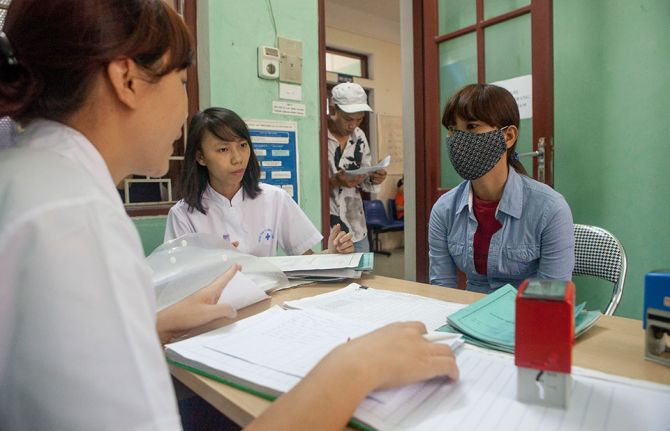
Press Statement
UNAIDS applauds the commitment of United Nations Member States to provide 1 billion more people with quality health services by 2023
23 September 2019 23 September 2019UNAIDS stresses the critical need to engage civil society and communities in every aspect of universal health coverage in order to leave no one behind
NEW YORK/GENEVA, 23 September 2019—UNAIDS welcomes the strong commitment made by United Nations Member States to achieve universal health coverage (UHC) by 2030. Member States recommitted to achieving UHC at the first ever United Nations General Assembly High-Level Meeting on Universal Health Coverage, which took place in New York, United States of America, on 23 September. During the meeting, United Nations Member States adopted a political declaration on UHC in which they reaffirmed the right of people to enjoy the highest attainable standard of physical and mental health as an integral part of the Sustainable Development Goals.
In the worrying context of shrinking civic space, UNAIDS is encouraged by the call made by Member States in the political declaration to engage civil society in health system governance, in health policies and in the UHC review process. Engaging civil society and communities worldwide will be critical to ensuring the overall success of UHC.
“We strongly urge governments to invest in the leadership and capacities of diverse communities, especially those that are underrepresented,” said Gunilla Carlsson, UNAIDS Executive Director, a.i. “To reach the furthest behind, universal health coverage needs to engage communities and prioritize rights-based, transformative approaches. This will ensure equity in access to health services, deliver people-centred results and eliminate health disparities.”
UNAIDS is committed to enabling communities, particularly vulnerable communities, to participate in health planning, implementation and monitoring. As part of that work, UNAIDS has worked with partners on the Global Action Plan for Healthy Lives and Well-Being for All, to ensure the full engagement of communities and civil society in UHC. The global action plan is to be launched in New York on 24 September.
UNAIDS also welcomes the commitment by Member States to leave no one behind, including children, youth, people with disabilities, people living with HIV, older people, indigenous people, refugees, internally displaced people and migrants. UNAIDS also urges Member States to reach groups particularly affected by HIV, including sex workers, gay men and other men who have sex with men, transgender people, people who inject drugs, prisoners and people in conflict settings, in order to ensure that even the most marginalized are reached with health services.
The political declaration on UHC recognizes that current action to achieve UHC is inadequate, with at least half the world’s population lacking access to essential health services. Currently, more than 800 million people have to spend at least 10% of their household income on health care and an estimated 100 million people are driven into poverty each year through out-of-pocket health-related expenses.
UNAIDS welcomes the commitment by Member States in the political declaration to stop the rise and reverse the trend of catastrophic out-of-pocket health expenditure and applauds the commitment to progressively cover 1 billion additional people with quality health services by 2023 with a view to covering all people by 2030.
UNAIDS supports the commitment of Member States to ensure sufficient domestic public spending on health, expand quality essential health services, strengthen health systems and provide adequate, predictable, evidence-informed and sustainable finances to support national efforts in achieving UHC. UNAIDS will continue to advocate for increased funding for health and for essential HIV prevention and treatment services to be included in health service delivery packages.
In addition to the commitment of Member States to achieving UHC, they also reaffirmed the strong commitments made in the Political Declaration on Ending AIDS, which was adopted by Member States in June 2016. In the Political Declaration on Ending AIDS, Member States recognize that progress in protecting and promoting the human rights of people living with, at risk of and affected by HIV has been far from adequate and pledged to review and reform legislation that may create barriers or reinforce stigma and discrimination.
“Legal barriers must be removed in order to ensure that the right to health is respected,” said Ms Carlsson. “The AIDS response has been grounded in a commitment to human rights, gender equality and non-discrimination and the needs of key populations must be met.”
Progress in the AIDS response and the achievement of UHC are interconnected and mutually reinforcing. Both will contribute to achieving the health-related targets of the Sustainable Development Goals, including ending the AIDS epidemic by 2030.
UNAIDS
The Joint United Nations Programme on HIV/AIDS (UNAIDS) leads and inspires the world to achieve its shared vision of zero new HIV infections, zero discrimination and zero AIDS-related deaths. UNAIDS unites the efforts of 11 UN organizations—UNHCR, UNICEF, WFP, UNDP, UNFPA, UNODC, UN Women, ILO, UNESCO, WHO and the World Bank—and works closely with global and national partners towards ending the AIDS epidemic by 2030 as part of the Sustainable Development Goals. Learn more at unaids.org and connect with us on Facebook, Twitter, Instagram and YouTube.

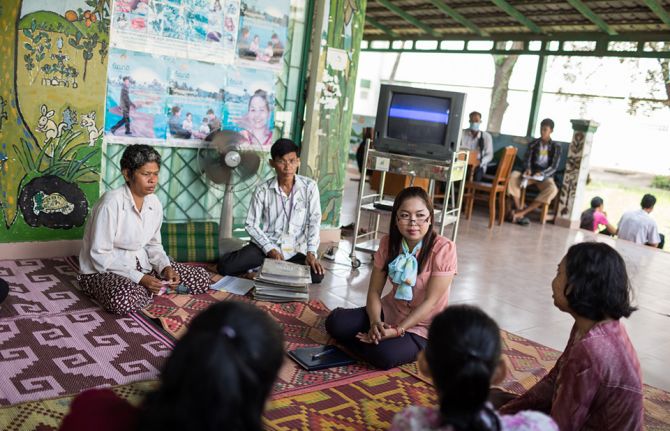
Update
Civil society engagement in universal health coverage
26 June 2019
26 June 2019 26 June 2019Achieving universal health coverage in a country is an ambitious, but transformative, goal. Communities are essential to the AIDS response and will be essential to the successful roll out of universal health coverage (UHC). When national governments establish a committee to coordinate UHC, it is important to ensure that all relevant communities are involved—civil society, including people living with HIV, should be included in decision-making. If civil society is not engaged early in the development of initiatives for UHC, decisions will be made about health services without the voice of the people most affected by those decisions. The graph below shows four ways in which communities contribute to the design and implementation of UHC.
Related information
Related
 Government ensures continuity of treatment in Malawi
Government ensures continuity of treatment in Malawi

10 February 2025

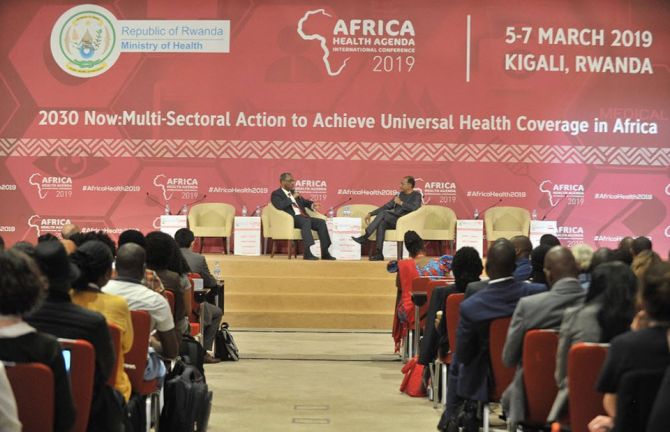
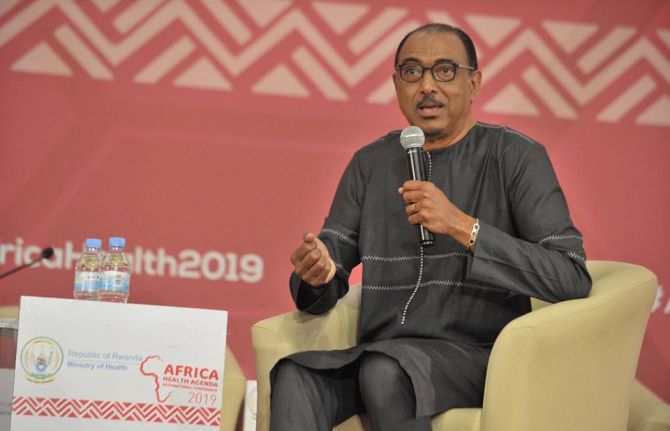
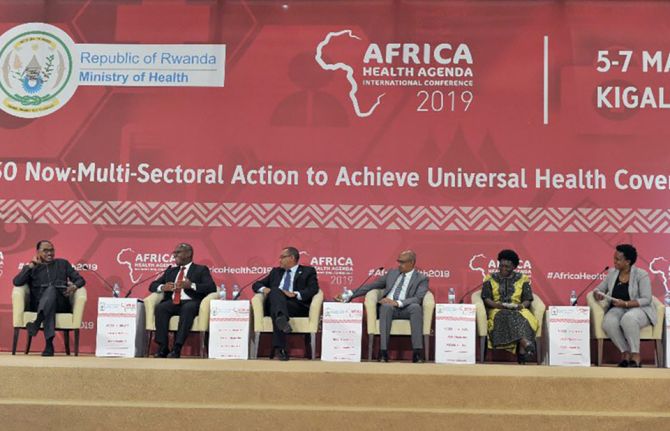
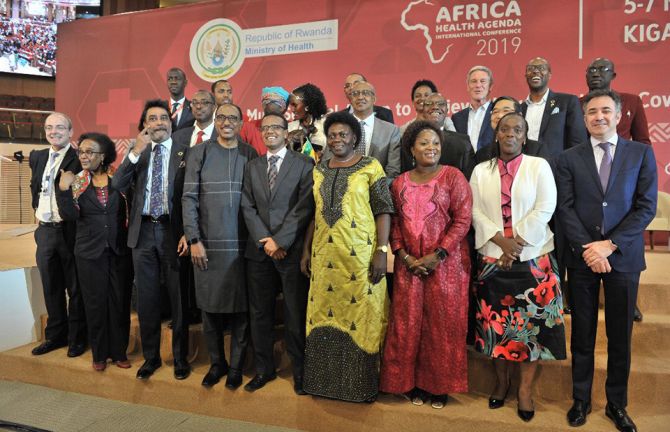
Feature Story
Africa — Achieving health coverage without compromising on quality
08 March 2019
08 March 2019 08 March 2019Momentum for Universal Health Coverage (UHC) in Africa is building and many African countries have already integrated UHC into their national health strategies. But with 11 million Africans pushed into extreme poverty each year because of out-of-pocket health expenses, how can Africa achieve UHC which delivers a quality package of care for people living in Africa?
The UHC debate was buzzing in Rwanda’s capital Kigali this week during one of the largest health gatherings in Africa, the Africa Health Agenda International conference 2019. Co-hosted by the Ministry of Health of Rwanda and the African Medical and Research Foundation (Amref Health Africa), 1500 health leaders shared new ideas and home-grown solutions to the continent’s most pressing health challenges.
Participants discussed the need for countries to embrace the concept of UHC and do their utmost to make it work. They stressed that good health allows children to learn and adults to contribute to societies and the economy. They also underscored that it can allow people to emerge from poverty and provides the basis for long-term economic security, essential for the future of the continent.
Host country President, Paul Kagame was awarded the honour of excellence in recognition of his political leadership on UHC. In a tweet he thanked Amref saying, “We owe this progress to partners like you who have joined forces with us in our journey to deliver a dignified and healthy life for all Rwandans.” The Minister of Health of Ethiopia also received an award for Ethiopia’s work in promoting primary health care.
Ensuring that everyone has access to basic health services is a challenge and the key to the success of UHC will be ensuring that the quality of services is good enough to improve the health of the people who access them.
“We need to track the impact of UHC,” said Michel Sidibé, co-moderating a high-level ministerial panel. “Coverage is not enough, we need to be delivering quality, affordable, accessible services to all. The ultimate measure of success for UHC will be whether the poorest, the marginalized and the most vulnerable people are able to benefit.”
During the conference Mr Sidibé participated in a townhall with young people. He spoke to them about their meaningful engagement in the UHC process saying that young people need to ‘claim and own the space.’ He also talked to civil society groups about the remarkable progress towards achieving the UNAIDS 90-90-90 treatment targets across Africa and of the critical need of their continued engagement on HIV within UHC.
The first ever United Nations High-Level Meeting on Universal Health Coverage will take place on 23 September 2019 during the United Nations General Assembly under the theme ‘Universal Health Coverage: Moving Together to Build a Healthier World.’
Region/country
Related

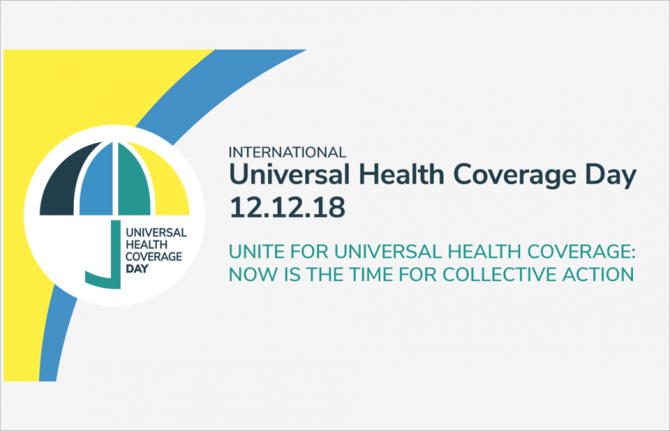
Press Statement
Message on the occasion of Universal Health Coverage Day
12 December 2018 12 December 2018Health is everyone’s concern. The world has been striving for access to quality and affordable health services since the Declaration of Alma-Ata, which called for health for all more than 40 years ago.
We have come a long way since then—improvements in access to, and the quality of, health-care services have increased life expectancy globally from 62 to 72 years. Yet progress is far from equal. Today, more than half of the world’s population do not have full access to essential health services, because they are unaffordable, inadequate, inaccessible for certain groups or simply unavailable.
There is increasing inequity around the world, with the richest 1% of the population now owning half of the world’s wealth. Life expectancy in the poorest countries of the world is appreciably lower than in the wealthiest, and living in areas blighted by poverty can mean a shorter life span and a lost future. The disparity is observed between countries and between different communities within countries, with the most vulnerable, marginalized and stigmatized being left behind.
Making progress towards universal health coverage that is truly universal means making progress towards equity, inclusion and social justice. It means a people-centred, human rights-based approach and community-led service delivery, as well as a recognition of the need to address the social determinants of health, including necessary reforms of laws and policies and removing stigma and discrimination and gender inequity.
The global response to HIV has illustrated the critical measures—decisive political leadership and commitment, community engagement and a response informed by scientific evidence—that can change the course of a global epidemic.
Reaching time-bound HIV prevention and treatment targets will make an important contribution to achieving the universal health coverage targets, and together will significantly accelerate progress towards realizing the Sustainable Development Goals.
In recognition of the theme of this year’s Universal Health Coverage Day, “Unite for universal health coverage: now is the time for collective action”, I call on everyone to embrace and contribute to the universal health coverage movement. United, we can make universal health coverage a reality for all.
12 December 2018
Michel Sidibé
Executive Director of UNAIDS
UNAIDS
The Joint United Nations Programme on HIV/AIDS (UNAIDS) leads and inspires the world to achieve its shared vision of zero new HIV infections, zero discrimination and zero AIDS-related deaths. UNAIDS unites the efforts of 11 UN organizations—UNHCR, UNICEF, WFP, UNDP, UNFPA, UNODC, UN Women, ILO, UNESCO, WHO and the World Bank—and works closely with global and national partners towards ending the AIDS epidemic by 2030 as part of the Sustainable Development Goals. Learn more at unaids.org and connect with us on Facebook, Twitter, Instagram and YouTube.
Press centre
Download the printable version (PDF)



